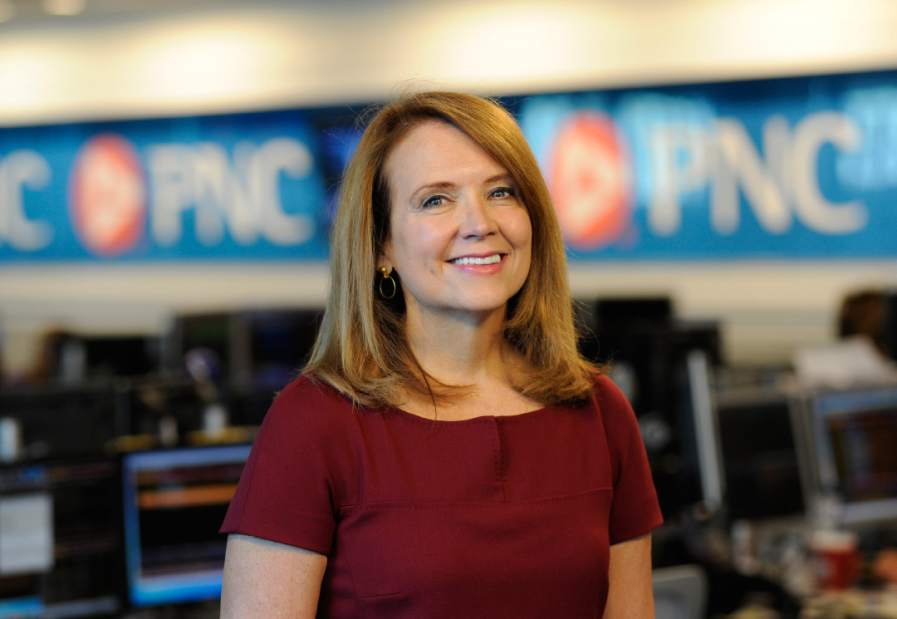https://archive.triblive.com/business/local-stories/finding-balance-key-to-pnc-capital-markets-chiefs-success/
Finding balance key to PNC Capital Markets chief's success

Submitted
Charlotte McLaughlin, president and CEO of PNC Capital Markets, was recently named one of the 25 most powerful women in finance by American Banker magazine.
You might say that Charlotte McLaughlin has it all.
The Fox Chapel resident has ascended to the top of her field as president and CEO of PNC Capital Markets. She has been recognized by American Banker magazine as one of the 25 most powerful women in finance. And yet she says she's still managed to find a work-life balance that makes time for her family.
Not that success came easily, particularly as a woman building a career in a male-dominated industry.
McLaughlin discussed with the Trib the issues women in banking face and how the industry has become more diverse since she began her career more than 30 years ago. Here edited excerpts.
Trib: What was your office like when you started back in the late 70s? Were there many other women?
McLaughlin: Very few.
Trib: You've been an active promoter of diversity in the workplace. Why?
McLaughlin: For me, being an advocate of other women is a passion. Not just a mentor, but an advocate, someone who is going to work to try to provide a path for women. If you look at the statistics, we lose a lot of women in mid-career. Things have improved a lot with diversity, but women as they climb into middle management positions aren't continuing through to the top.
Trib: What are some of the reasons you've seen them leave?
McLaughlin: Maybe they hit a little bit of a peak where they don't see any opportunity to advance. Maybe they move into other fields that offer them more opportunity faster. Or sometimes a lot of articles will say that women have more responsibilities outside of work. The flexibility that's required will play a factor in how they advance in their career.
Trib: How would you say the opportunities have changed for women in finance since you started?
McLaughlin: The workplace has changed dramatically. It has really required changing at the top all the way down. I think it's changed with respect to diversity, not just women. There's more of a culture of inclusion. There are mentoring programs for women.
Trib: Why is it advantageous for banks to have a diverse workforce?
McLaughlin: Our customers are diverse. We don't want to have that situation where we're going out sitting in a conference room with a client and not having a diverse workforce. The creativity and ideas that come from a diverse workforce are rich. I think they provide a lot of creativity and connection to our clients.
Trib: What's an example of an initiative that was begun at the bank, or a program or some interaction that wouldn't have happened had it been a culture dominated by white men?
McLaughlin: The board room is an interesting example. I sit on a couple boards. When I first joined the boards, they were heavily weighted toward men. And, if you should get a woman and a couple women on the board, there starts to be different discussions. Oftentimes you see women are more collaborative. So there oftentimes are many discussions when the company is looking to fill senior positions, that there's a full slate of diverse candidates. Women on boards tend to demand that. It's not about quotas, it's about finding that talent.
Trib: Are there things that business schools need to be doing to encourage more diversity in finance?
McLaughlin: The pipeline is robust. We have a very good flow of women flowing into the bank. I think it's a little over 50 percent. So we're able to attract the talent.
Trib: So it's just supporting that talent once they mature through their careers?
McLaughlin: Mid-career, we lose a lot of women. We've collectively worked and even worked with an outside consultant to understand why we lose them. And it's not just PNC. It's the industry.
Trib: What has the consultant told you?
McLaughlin: There's a lot of different reasons. But most of them are just feeling that they're really good at what they do, but they don't see the career path, the advancement.
Trib: Do you have any thoughts on why?
McLaughlin: It's really hard to pinpoint it. Sometimes it's family. But sometimes it's just looking for more responsibility faster. Sometimes it's flexibility. Being able to have work-life balance and flexibility.
Trib: How have you managed it?
McLaughlin: You've got to be resilient. The one thing that was really positive for me that came out of the whole work-life balance was learning to delegate more. There's a lot of studies that say women are really good at what they do and they tend to do it themselves.
Trib: Do you think that made you a better manager?
McLaughlin: Absolutely. It was unbelievable, as I had to delegate more because of work-life balance. People stepped up to the plate. The more I delegated the more I could do. And it was definitely part of my success.
Trib: What are the top hurdles facing diversity in banking and finance these days?
McLaughlin: I think that when I look at that, I look at the middle of the funnel. You've got a lot of women coming in, they leave and there's not as many that make it through the top. One of the hurdles is how do we create strong career paths and empower women in that mid-career. That would be a priority. And then once we do that, we'll have more women in that pipeline and then making sure that they have the opportunity and are considered for senior level positions.
Chris Fleisher is a staff writer for Trib Total Media. He can be reached at 412-320-7854 or cfleisher@tribweb.com.
Copyright ©2025— Trib Total Media, LLC (TribLIVE.com)
